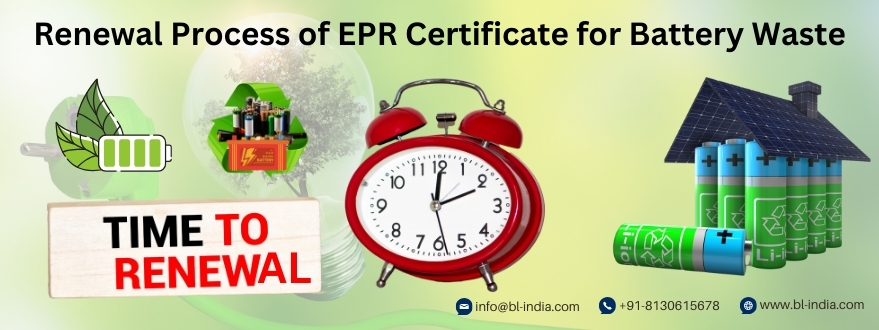
As the world continues to grapple with environmental challenges, proper management of hazardous waste such as batteries is of utmost importance. It's crucial for businesses and organizations handling battery waste to stay compliant and uphold their responsibility towards sustainable waste management practices.
Extended Producer Responisbility (EPR) plays a crucial role in ensuring that producers take responsibility for the entire life cycle of their products, including their disposal and recycling.
Whether you're a manufacturer, importer, or dealer of batteries, staying compliant with regulations and maintaining a valid EPR Certificate for battery waste is essential not only for regulatory compliance but also for demonstrating your commitment to sustainability and environmental stewardship.
In this blog, we'll guide you through the steps involved in renewing your EPR certificate, ensuring your business remains compliant and environmentally conscious.
The EPR (Extended Producer Responsibility) Certificate for battery waste is a mandatory certification required for manufacturers or importers of electronic or electrical equipment in India, as stipulated by the Ministry of Environment, Forests, and Climate Change (MoEFCC).
Under the EPR framework, producers have the responsibility to ensure the proper management and disposal of E-waste, including batteries, by relocating or transferring them to licensed dismantlers or recyclers. The Central Pollution Control Board (CPCB) is tasked with issuing EPR authorization on behalf of the government.
The Battery Waste Management Rules 2022, introduced to replace the previous regulations, reinforce the environmentally sound handling of used batteries. According to these rules, every producer must register with the CPCB through a centralized online portal and apply for renewal before sixty days of expiration.
These rules define a producer as any entity involved in manufacturing, selling, or importing batteries, including refurbished ones, under its brand. This regulatory framework operates on the principle of Extended Producer Responsibility, where battery producers are accountable for the collection, recycling, and reuse of waste batteries, promoting a sustainable approach to battery waste management.
In India, the EPR Certificate for battery waste is crucial for several reasons, highlighting the significance of responsible waste management practices in the country's environmental landscape.
Here are some key points explaining why this certificate is needed:
The validity of the EPR Registration Certificate for battery waste is initially set at 5 years in India, providing producers with a defined period to fulfil their obligations regarding waste management. However, it's important to note that this validity period can be extended subsequently upon renewal.
Renewal of the EPR certificate is necessary to ensure continued compliance with regulatory requirements and to maintain authorization for managing battery waste. To renew the certificate, producers are required to submit specific documents as per regulatory guidelines, along with the payment of applicable fees.
This renewal process allows producers to demonstrate ongoing commitment to responsible waste management practices and environmental sustainability. By renewing the EPR certificate, producers reaffirm their dedication to fulfilling their extended producer responsibility obligations, contributing to the conservation of natural resources and the protection of the environment.
Renewing the EPR Certificate for battery waste in India involves a systematic process outlined by regulatory authorities to ensure continued compliance and commitment to responsible waste management practices.
The procedure for obtaining an EPR Certificate for battery waste in India involves several steps to ensure compliance with regulatory requirements and environmental standards.
To obtain an EPR Certificate for battery waste in India, several essential documents are required to demonstrate compliance with regulatory requirements and environmental standards. These documents include:
EPR Certificate for battery waste is a crucial aspect of maintaining regulatory compliance and demonstrating commitment to responsible waste management practices. For manufacturers seeking a streamlined and efficient certification process, partnering with a reliable service provider like Brand Liaison can significantly simplify the process.
With our expertise and comprehensive support, manufacturers can navigate the process quickly and easily, ensuring timely compliance with regulatory requirements.
With the support of our team, manufacturers can continue their operations seamlessly and focus on their core business activities while ensuring that their environmental responsibilities are met effectively.